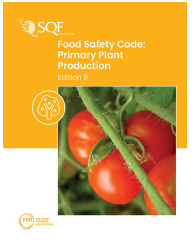By Carey Allen, Vice President, Business Development & Strategy
 Pests, whether they be insects or animals, fungus, molds and bacteria, or weeds, carry disease, cause damage and losses. Exposure of food or food contact surfaces to these pests, creates the risk of food contamination, illness, and the spread of infectious diseases. Controlling pests is a necessary and critical element of food safety management system, but caution is advised in deploying chemical pest controls.
Pests, whether they be insects or animals, fungus, molds and bacteria, or weeds, carry disease, cause damage and losses. Exposure of food or food contact surfaces to these pests, creates the risk of food contamination, illness, and the spread of infectious diseases. Controlling pests is a necessary and critical element of food safety management system, but caution is advised in deploying chemical pest controls.
SQF certification encourages an actionable framework toward more sustainable management practices and approaches pest control responsibly through an Integrated Pest Management (IPM) system approach.
Pollinators and soil organisms are benefiting from the booming interest in regenerative agriculture as the focus on responsible use of pesticides is widely accepted as necessary to improve our environmental sustainability. What does “responsible use of pesticides” mean and why does the definition matter? Everyone wins when pesticides are used responsibly, right? Is there a debate here?
What may come to mind when you think “responsible use” is a competent individual has assessed the needs of the plants being grown, the season, the weather, the harvest cycle, the critters in the environment and the conditions that may lead to new critters, and their detrimental effects needing correction or prevention.
The competent individual has intimate knowledge of the ecosystem and physiology of the plants to know precisely when and how to apply the appropriate pesticides with a less is more approach, maybe not using chemicals at all utilizing IPM system approach. Integrated Pest Management (IPM) is a system used to control pests of all sorts using a variety of tools and techniques, including biological controls (killer ladybugs, disease resistant plant varieties), physical controls (barriers, crop rotation), and chemical controls (agrochemicals). The intent of IPM is to identify and utilize the least adverse impact methods available to control pests and produce the necessary crop. Responsible use in this context is what is intended to ensure all options for control are considered, and agrochemicals are a part of the solution, but not necessarily the favored or only solution.
Another interpretation of “responsible use” is using agrochemicals as the first choice so long as the effective dose and frequency necessary to take care of the issue is determined and not exceeded. The term “responsible use” may be offered way to leaving the door open to the use of highly toxic and damaging materials, with the idea being that only least amount required for efficacy will be applied.
Responsible use in this context does not ensure that human and environmental health are given top priority in determining the best approach to manage pests. Unfortunately, the least amount effective for treating an issue may still have unacceptable adverse effects on the humans and the environment involved with the farming operation or the food produced there. Alternatives to chemicals, or less harmful agrochemical options, are a viable solution to controlling pests but it does take investment in resources to understand the complexity of the pest related challenges and solve for the issues.
Farms running an integrated pest management system often utilize competent professionals available from the local university or state extension agency to increase the efficacy of their program and save costs on consulting fees or hiring full time experts. Nevertheless, the farm operators are responsible for understanding the applicable regulations relating to pesticide use and the appropriate methods of control for the product. Establishing a deep understanding of the farm’s ecosystem to establish an effective IPM system brings into greater focus the importance of protecting the habitats of beneficial organisms in the soil and surrounding environment. Its an investment in the long-term productivity of the farm and its resources and each operation adopting IMP adds to the total effort toward food system sustainability.
Learn more about the SQF Code for Primary Plant Production certification and how its requirements for pest control can provide a structure to strengthen your IPM program.

